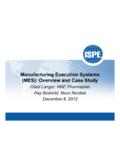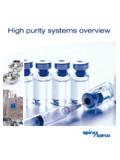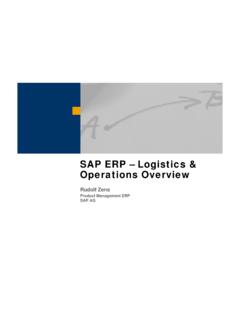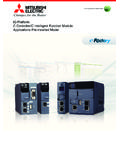Transcription of 9 How to Survive an FDA Computer Validation Audit
1 How to Survive an FDA Computer Validation Audit The Myth Within the pharmaceutical, biotech, and medical device industry there is much fear and concern over approaching FDA audits. The FDA strikes fear in the hearts and minds of employees all over the world. More than any other regulatory body in these industries, the FDA rules with an iron fist. But is that true? How much of this gut wrenching is really necessary to Survive an FDA. Audit of your Computer systems successfully? What can you do to mitigate the emotional impact of the event?
2 You can PREPARE! There is life after an FDA Audit that focuses in part on your Computer systems. The Truth The FDA has approximately 1100 inspectors. They work for the United States federal government. They have been well trained in Good Manufacturing Practices (GMP) and are well educated. Most inspectors have a speciality and tend to feel more comfortable when dealing with those areas. However, most of the FDA inspectors are not Computer information specialis ts. They may know the acronyms and ask about your LIMS (Laboratory Information Management System), ERP (Enterprise Resource Planning) system, DMS.
3 (Document Management System) or MES (Manufacturing Execution System). The trend over the last years has been that they are becoming more Computer literate and now they have a mandate to inspect Computer systems in every domestic and foreign Audit at least two per Audit . They are being trained in what to look for in an increasingly computerised world. They will focus on how you handle materials, how you label product, how your environmental and water systems work, and how your labs work. If you can give a brief overview of your IT (Information Technology) environment it will be helpful as a first start.
4 You only need to provide the picture of the systems you consider GMP relevant. The FDA will not ask about how you calculate product cost, for instance. They will ask about how you receive materials and give them a status via the Computer . Practical Proactive Approach Computer Validation is nothing more than good business practice. There is nothing unreasonable in the GAMP guidelines, for example. To maintain your Computer environment over the years and to reap the benefits from electronic data capture, good documentation is necessary.
5 In order to prepare for an successful FDA Audit there are steps to take hopefully not two weeks before they arrive. Who will explain the systems in use? Determine who will be able to articulate well the Computer systems you already use. Everyone is not a good candidate to put in front of an inspector. It is important to analyse the personality of your staff. Quality assurance (QA). employees are well schooled in what to say and what not to say. But IT. employees generally have not been so trained.
6 It is advisable for the person who speaks about the computers in use to be confident and self-assured . and someone who knows the business very well. Ideally that person has a background that includes an element of quality assurance and thus knows what sorts of things an inspector may look for. The FDA inspector probably will not ask why a program was written with C++ versus Java, for example, but will be concerned about the quality of the code. The questions may focus on specifics like Is there an Audit trail when labels in the warehouse are re- printed because they got damaged before they were applied to the containers?
7 '. Many IT professionals did not grow up in the pharmaceutical, biotech or medical device world. It is not an easy task to find someone who comes from the industry. Thus it is important to train these IT people in the art of dealing with an inspection. Just because the bits and bytes of the system fascinate them does not mean the inspector will care. However, the inspector will care that the system is well documented. Unfortunately documentation is typically not the favourite task of software developers or system maintainers.
8 The ideal IT person to explain the systems in use should be familiar with GAMP or PDA guidelines for Computer systems and software lifecycle development practices, should be able to walk an inspector through the company's policies for Computer Validation and general system maintenance, and should be able to field questions from a business and QA perspective. It is important that the person not over-explain the systems in place. What about software vendor audits? There is a precedent in the pharmaceutical, biotech and medical device industry to conduct vendor audits.
9 From a software perspective this is becoming increasingly complex. There are so many products in use that it is not feasible to Audit every vendor. So it is important to take a practical approach. From a business perspective vendor audits are time-consuming and expensive for both the software vendor and the pharmaceutical manufacturer perspective. There is a lack of expertise on both sides for these audits unless the software is industry specific ( LIMS) or there is a large customer base ( SAP). For out-of-the-box software like Microsoft Word it should be considered a de facto standard.
10 It would be pointless to think you need to Audit Microsoft. It is what you do with the tool that counts. Some applications (like SAP and Documentum) are now in such wide use by this industry that an Audit is almost not necessary. However, it is important to have a quality verification. This verification could be simply that the parent company or an affiliate is using the product in a GMP environment or that a reference visit to a similar company was conducted. This quality verification should be documented via a memo to file' or report.







